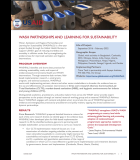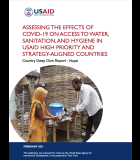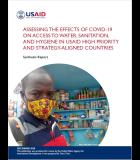Hariyo Ban (“Green Forests”)
The five-year, $39 million Hariyo Ban project falls under the U.S. Government’s Global Climate Change Initiative, and is designed to reduce threats to the country’s ecosystems through interventions in two critical bio-diverse areas covering over a third of the country: the Terai Arc Landscape and the Chitwan-Annapurna Landscape. The project is designed to help communities build resilience to adverse effects of climate change and improve the livelihoods of Nepal’s most impoverished communities. Closely aligned with the GON’s Three Year Nepal Biodiversity Strategy and the National Adaptation Plan of Action, Hariyo Ban provides policy support at the national and sub-national levels to promote biodiversity conservation, sustainable forest management, and climate change adaptation for poverty alleviation and economic growth.
Activity Description
Improve Biodiversity Conservation:
- Reduce threats to targeted species and/or terrain
- Restore habitat connectivity for movement of targeted species to climate-safe areas
- Strengthen the internal governance of community groups and small non-governmental organizations
- Increase incomes of vulnerable people and forest communities by introducing alternative sustainable sources of livelihood to reduce threats to biodiversity
- Improve national policy and planning conditions to facilitate sustainable natural resource management and biodiversity conservation
Ensure Landscape Sustainability
- Support the formulation and implementation of policies, strategies, and working guidelines that reduce carbon emissions from deforestation and forest degradation (REDD+)
- Develop national capacity for forest inventory management, greenhouse gas monitoring, and equitable distribution of climate finance benefits among all stakeholders
- Analyze and systematically address the factors contributing to deforestation and forest degradation • Develop, test, and expand sustainable methods for disbursement of carbon credits
Increase Adaptation to Climate Change
- Engage the GON and the private sector in understanding the impact of climate change and climate change adaption options
- Establish participatory systems for monitoring vulnerability in targeted communities
- Pilot and expand actions reducing vulnerability to climate change
- Provide support for climate change adaptation policies, strategies, and guidelines
Expected Outcomes
- Reduce/sequester 3.3 million metric tons of CO2 equivalent emissions
- Bring over 500,000 hectares of degraded or deforested forest areas under improved management
- Provide direct capacity building and livelihood support to approximately 180,000 people to help them cope with adverse impacts of climate change
- Improve policies and plans encompassing forestry, biodiversity, and climate change adaptation in Nepal
- Improve the capacity of the government of Nepal and civil society for sustainable management and equitable use of forest and biological resources
- Increase the capacity of GON and CFUG in maintaining forest inventory, and greenhouse gas monitoring and reporting
- Improve and expand climate adaptation options for rural communities





